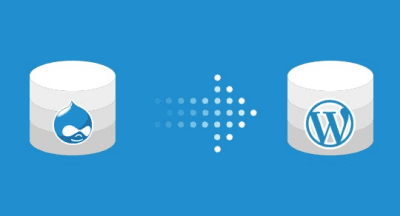
If you are planning to migrate your website from Drupal to WordPress without making mistakes, you have to plan to ensure do it successfully. Whatever website you running, the migration procedure is still the same. Plan carefully and pay attention to detail with reasonable expectations.
In this guide, I will help you grasp the task of moving your site from Drupal to WordPress.
Why are Drupal users migrating to WordPress?
In the early 2000s, there was a rush for Drupal since it was the only platform that offered a content management system.
This made many developers and web owners run to it for web hosting services. That is what made it transform into an enterprise platform, with a steep learning curve, that demands regular performance tuning and expensive hosting.
The other issue that the platform has is the backward compatibility between versions. Upgrading to another version means starting again from the ground up. Since many who are using Drupal find it hard to spend that many resources to upgrade, they remain with older versions that are not updated with the latest technology.
This has made the platform vulnerable to cyber-attacks. Those operating from the current Drupal version end up opting out of it by migrating to other platforms like WordPress or Joomla that offer plenty of flexibility.
Read: Learn How to Secure WordPress Login Page from Hackers
Many are finding WordPress development the best platform to migrate their site to for its simple requirements and maintenance.
WordPress also has a smaller footprint, lower management overhead, a rich plugin ecosystem, and a user-friendly interface. It also has a large user community that offers support to fellow users.
Things that can go wrong during a Drupal to WordPress migration
The majority of migration guides, tutorials, and tools make migration from Drupal to WordPress sound so simple which is not true. To help you understand the seriousness of the situation, try searching for migration and disaster in the same search phrase and you will be surprised what comes up. There are two types of migration failures: traffic drops and runaway costs.
- Traffic drop – In case the migration pushes through, the traffic on the new site may plummet due to failure to address the SEO impact of the changes. This may be a result of dissatisfied visitors who are not so impressed by the new look. In some cases, the effect may be irreversible and you may lose your revenue for good
- Runaway costs – In some instances, the budget may surpass the estimates. Cost is not only about funds but also an overstretched employee time. If the migration is not planned accordingly, it may lead to an endless process of migration, especially if you opt for cheap solutions.
Migrating Drupal users to WordPress
The highest priority should be placed on user account migration. This applies to owners of membership and community sites. The majority of site migration takes place behind the scenes. Subsequently, user migration requires assent from logged-in users.
This brings another migration challenge in terms of user management after the migration has taken place. You need to map the following components in the database:
- User data and metadata – These are elements like user ID, username, email address, and associated profile fields. Usually, this process is fairly simple since Drupal user fields us mapped into the WordPress user and user Meta tables seamlessly.
- Roles and permissions – Compared to WordPress, Drupal’s roles and permissions are more flexible. However, with a little creativity, and the use of plugins, you can also make it easier for the WordPress site as well. This is perfect if you are trying to set complex permissions.
- Content authorship – This is another straightforward setting and is done by setting the posts’ post author field with the appropriate user ID
- Credentials – What makes it hard to use passwords when migrating is the different password hashing algorithms used by both platforms
Automated migration vs. Migration service
There are several Drupal to WordPress migration plugins and automated tools. Choosing the right tool for the migration process depends on the complexity of the configuration and the particular goals of your migration.
There are several advantages and disadvantages of both automated migration and migration services.
When to use a migration plugin
When migrating your site from Drupal to WordPress, migration plugins are used to convert Drupal content that has a clearly defined counterpart within WordPress.
These may include exports for article titles, the main article content body, tags, categories, and comments or any other element that can be automated.
You can use a migration plugin when:
- The Drupal platform that you are migrating out of has few customization options like simple page-and-article setup or uncomplicated custom content types.
- The installed modules for Drupal are mainstream and can easily export into a WordPress equivalent plugin.
- Running a hobby site with very little budget or are willing to spend time figuring things out.
When to hire a migration consultant:
There are instances where automation won’t work well. This is due to how content in Drupal sites is configured. Content is created in a way that needs human decisions. For example:
- Which migration approach should be taken?
- How closely will the approach meet your project’s goals?
- What kind of compromises must you make?
- How will you handle custom content types?
- Will Drupal taxonomies be handled differently within WordPress?
- Are you combining or converting content types?
- Is data cleaning required and will you do that during the migration or after going live?
Conclusion
As a WordPress developer, these are some of the things that you should consider when you want to migrate your site from Drupal to WordPress. You should always plan before migration since there are many instances where things go wrong. You should also choose the right tool to use in the migration process. I hope that you are now well informed on the measures you need to take before migrating your site from Drupal to WordPress.
Naman Modi is a Professional Blogger, SEO Expert & Guest blogger at NamanModi.com, He is an Award-Winning Freelancer & Web Entrepreneur helping new entrepreneur’s launches their first successful online business.
Social Media Links Below:
Twitter– https://twitter.com/namandigital
Facebook– https://www.facebook.com/NamanModiDigital
Pinterest – https://in.pinterest.com/NM_Digital/








